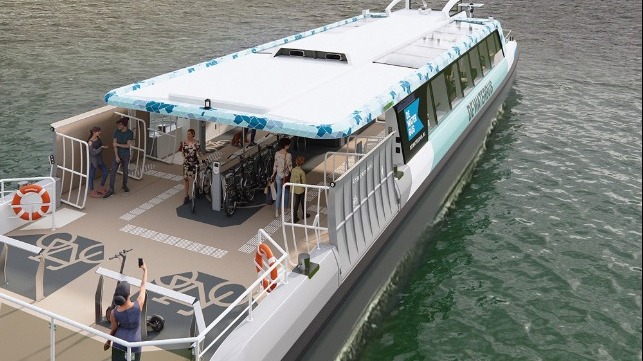Netherlands Expands Intercity Service With Damen-built Green Ferries

As part of an effort to expand public intercity transportation in the Netherlands, Damen Shipyards signed a contract to build nine fast ferries with enhanced environmental characteristics. Damen designed the vessels to fulfill the green ambitions of the operator, Aqualiner-Swets, the regional minister of transport, and the local governments, including that all ferry services will be completely emissions-free by 2030.
The ferries were ordered by the Dutch ferry joint venture Aqualiner-Swets. The company recently won an EU tendered contract for up to fifteen years. They will be providing public transportation between Rotterdam and the Drecht cities on behalf of the Province of South Holland starting in 2022.
Damen will build a total of nine vessels, six of which are hybrid and carbon fiber Waterbuses to serve the fast ferry Intercity routes. Among the environmental elements incorporated into the design, Damen and the operators included the possibility to convert these vessels to fully electric propulsion, by 2030 at the latest. The three other vessels, which will operate as city ferries starting in 2022, will be fully electric.
“Our work on this project is a good demonstration of Damen’s role, not only as a shipbuilder, but as a provider of comprehensive maritime solutions,” said Vincent Maes, Damen’s Sales Manager Benelux. What makes it special is our close cooperation with the team of Aqualiner-Swets. “Together we have considered every aspect of the operation, looking at vessel types, routes, and speeds for maximum fuel efficiency and considering methods to improve the passenger experience.”
All nine of the Waterbuses are extremely efficient in terms of weight, hull design, and systems, featuring a hybrid-electric arrangement for peak shaving. Sustainability was an important theme running throughout the overall design, according to Damen. The vessels’ interiors, for example, use natural materials such as wool and wood, as well as recycled materials.
Together with the Maritime Research Institute Netherlands (Marin), Damen also performed a parametric study and hull optimization, to improve the performance on the low wash catamarans. This is aimed at reducing the wake wash produced by the vessels, so as not to cause disruption to those living and working on the water in the area of operation.
